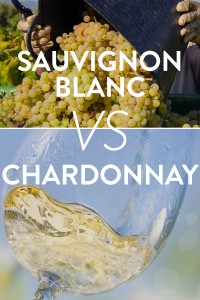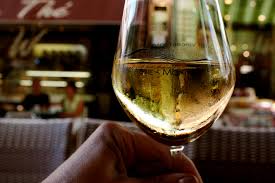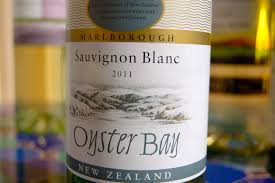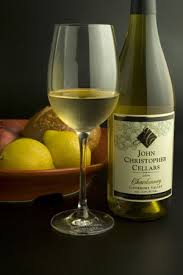Introduction
The following scenario is a very typical and common one: you sit down somewhere in a cafe, bar or restaurant and fancy a glass of white wine. You ask for white wine by the glass. I bet you that 99 times out of a 100 you will get the question as to which white wine, either Chardonnay or Sauvignon Blanc. This is not very surprising, because the Chardonnay and the Sauvignon Blanc are two of the very famous (if not the most famous) white grape varieties in the world. The wines made from these grapes are among the most drunk and poured dry white wines.
You often hear that people are either a Chardonnay or a Sauvignon drinker when it comes to white wine. And yes, you should just know what the difference is between these two and where you feel that your taste fits in.
So, read on and find out the difference between Chardonnay and Sauvignon Blanc.
Chardonnay versus Sauvignon Blanc
Chardonnay has its origins in the Burgundy region in France. Although Chardonnay is now planted all-over-the-world and very good wines are made in many places, some of the most appealing and distinctive variants still come  from Burgundy. Just only look at Chablis, Meursault and Puligny-Montrachet wines from this area.
from Burgundy. Just only look at Chablis, Meursault and Puligny-Montrachet wines from this area.
The wines made from the Chardonnay grape are dry, full and round, and have primary fruit flavours of apple, yellow melon, pineapple and star fruit. Chardonnay is often aged in oak barrels, the taste of which often is creamy and hints of vanilla and butter can also be identified. Nowadays Chardonnays are mostly lightly oaked and a good deal of unoaked is on the market.
In combination with food a Chardonnay fits very well with creamy and delicate flavours such as fish and chicken, possibly with some fuller, rich sauces.
Sauvignon Blanc finds its origins in the Bordeaux region and is well known from the Loire and is not meant for oaking. Meanwhile, this grape variety is also planted all over the world and there are good wines made from among them in Chile and New Zealand. However, the more refined Sauvignon Blancs still come from the Loire, amongst others the renowned appellations of Pouilly Fumé, Sancerre and (somewhat less known) Menetou Salon.
The wines from the Sauvignon Blanc grape are dry and light and are often called “dusting” by the glass from the bursting flavour that can be described as ‘green’. Aromas that can be recognized in these wines are: gooseberry, grapefruit, white peach, passion fruit, green apple and even freshly cut grass and boxwood (or buxus).
Eh yes, “freshly cut grass” and “boxwood”. That may sound crazy and dirty to find in a wine and generally few people have actually tasted these things, however, it is quite clear that these aromas can be recognized in the wines of Sauvignon Blanc. Wine tasting is mainly done with your nose and who will deny that they did not enjoy the delicious aroma of a freshly mowed lawn or a cut boxwood hedge in the spring or summer? If not, just rub a leaf or blade between your fingers and smell. Maybe you can just immediately associate with a nice Sauvignon Blanc that you have ever tasted.
Combined with food a delicious Sauvignon Blanc goes well with goat cheese (separately or in a salad or other dish), lighter fish dishes (with not too creamy sauces), seafood, salads and white meat.
So what will be the one for you?
Although in wines of the same grape variety, different flavour styles can be characterized (especially for the Old versus New world=within or outside Europe), the distinction between wines from Chardonnay and Sauvignon Blanc can generally and briefly be summarized as follows:
 Do you want a fuller, rounder, tastier and riper wine, then take a lightly oaked Chardonnay, especially New World countries such as USA (California), Australia, New Zealand and S-Africa. And also, if you’re looking for something lean, fresh and vibrant, you will want unoaked Chardonnay. It’s here that the grape’s true characteristics are at the forefront and you’re often left with a refreshing, mouth-watering white wine.
Do you want a fuller, rounder, tastier and riper wine, then take a lightly oaked Chardonnay, especially New World countries such as USA (California), Australia, New Zealand and S-Africa. And also, if you’re looking for something lean, fresh and vibrant, you will want unoaked Chardonnay. It’s here that the grape’s true characteristics are at the forefront and you’re often left with a refreshing, mouth-watering white wine.
Do you feel you want to have a fresher, tighter, slightly drier wine, take a Sauvignon Blanc, especially the ones from France and New Zealand. A Sauvignon Blanc often has a higher acidity than Chardonnay. If, however, a sweeter, fuller and rounder Sauvignon Blanc is to your liking, you should instead look to wines made in the United States and Australia, where the warm climate creates stronger flavours of peach, kiwi and even passion fruit.
Conclusion
The difference between these two grape varieties is so large that there are supporters and opponents for both. This also explains why in typical restaurants and pubs you will be presented with both options . The one Chardonnay is not the other and like Sauvignon Blanc these grapes grow in every climate and in every soil type, each time having different results.
In short, you must either have an extensive knowledge of wine or you take sound advice in order to buy the bottle that comes closest to your liking. It is also not exactly necessary to put yourself in this square: Chardonnay or Sauvignon Blanc, but taste something different. You could try each one of the following great white wines and see if you like them: Gewurtztraminer, Riesling, Pinot Gris, Pinot Blanc or Viognier. See my detailed description here.
Anyway, as you might have guessed, I am a Chardonnay lover and have become so after drinking various white wines in the course of some 30 years. A Chardonnay, to me, is more tasty than any Sauvignon Blanc I ever drank. It is my experience that I can find a Chardonnay to pair with almost every meal, cheese or state of mind for that matter. The variety is virtually endless and there is a taste for everyone. It is just a matter of finding the taste that suits you best.
This site would like to help you to find your taste amongst and gain access to the world’s best Chardonnays from 8 countries and divided in product reviews and ratings by markets: USA, UK and Australia. The summary of these reviews and ratings can be found by clicking on the three images to the right (for mobile users just under this text) under the heading World best Chardonnays for delivery to the USA, UK or Australia.
Anyway, please let me know through the comment box if I can be of any assistance to you and I will reply within 24 hours.

I really like to cook my mushroom soup ( with fresh mushrooms) with white wine. I purchased Chardonnay and Sauvignon Blanc (2013). Which one should I use?
Thanks for your input.
In this case, both can be used. So, I guess it will be up to your personal preference. And why not do a test and try both and find out which combination you like best. Hope you enjoy!
Opinion on whites from Spain and Portugal.
Spain is more known for its red wines than its whites. I myself have not ever seen a white wine from Portugal. However, you raise a good point and I will shortly put some research into this and come back to you.
Here is some more about Iberian white wine.
For years, when discussion turned to the finest wines of Portugal and Spain, white wine never really came up. Fortified wines – sherry, Port, Madeira – and red wines (above all Rioja), were what found their way into collectors’ cellars.
Not any more. Of all the many changes that have taken place in Iberian wine, it’s the rise of white wines that has been rather significant. Now white winemakers in Spain and Portugal are responsible for quite some excellent white wines, with a France-like array of appellations (or DOs), flavours, grape varieties and styles. The grapes have all localised names, which are not yet known to the general public.
Something to keep our eyes on!
What about whites frm Spain and Portugal?
Hi Jerry. I just found your site, in looking for a wine recipe. I love good Chardonnay, and here I am juicing two five gallon buckets of the perfectly ripened grapes from a relative’s arbor. Now then.. I love white grape juice, so was going to can some it that way, and also make some white grape jelly, but now when I look at how much juice I have, I am thinking I would dearly love to make them a bottle or two of wine to repay for all the fruits of all kind they gave me from their property (not just grapes, but we all like wine.). Can I make a batch with juice I have brewing as I speak that is being extracted from the skins (no seeds..whatever kind these are, they are seedless whites). Or do they need that fresh skin for fermentation? I still have some untouched ones, but my guess is I will have to do something with them before you can get back to me. I also have five gallons of plum juice in the freezer. Can it be made into wine? Thanks for your input..
Hi Carolyn, glad to read you love Chardonnay. In order to make wine the grapes will have to be de-stemmed and crushed or whole-cluster crushed. You can crush them yourself or make use of a custom grape press if available in your surroundings. All further specifics as to the process and fermentation I have described in detail in my post: how to make your own unique Chardonnay here. By using similar processes with other fruit juices (like the one from plums) you can produce wines as well. Good luck and if you have more questions, please do not hesitate to come back. Cheers, Jerry
South Africa is producing some of the finest Chardonnays in the world. Let me just mention Stellenbosch and Rustenberg. If you have the chance, try them in country. I would appreciate it if you would visit this website again, as I am collecting reviews and ratings for the best Chardonnays worldwide.
I really love wine. Let me say that before I elaborate.
This post helped me out big time. Even though I’ve been to South Africa for half a year I didn’t know some stuff stated here.
And I thought I knew a bunch about wine. Thanks for sharing this info. Definitely became a wiser man because of this and will keep an eye on your website for sure.
Keep up the good work!